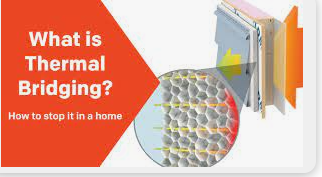
What is Thermal Bridging and the Impact on the Environment
Thermal bridging refers to the phenomenon in building construction where a pathway of significantly higher heat transfer exists within the building envelope, allowing heat to flow more easily through the building's insulation. This occurs when a conductive material, such as metal or concrete, creates a direct connection between the interior and exterior of a building, bypassing or reducing the effectiveness of the insulation. Thermal bridging can have several negative impacts on the environment:
-
Increased Energy Consumption: Buildings with thermal bridging lose more heat in cold weather and gain more heat in hot weather, leading to increased energy consumption for heating and cooling. This, in turn, results in higher greenhouse gas emissions if fossil fuels are used for heating and cooling.
-
Reduced Indoor Comfort: Thermal bridging can lead to temperature variations and discomfort in interior spaces, as well as potential condensation and mold issues, which can impact indoor air quality.
-
Higher Operating Costs: Buildings with poor thermal performance due to thermal bridging require more energy to maintain comfortable indoor conditions. This results in higher energy bills and operational costs for building owners and occupants.
-
Increased Carbon Footprint: The increased energy consumption associated with thermal bridging contributes to higher carbon emissions, exacerbating the environmental impact of buildings. This is especially concerning in the context of climate change and the need to reduce greenhouse gas emissions.
-
Material Resources: Building materials used for insulation, such as foam boards, fiberglass, or mineral wool, often have environmental and energy costs associated with their production. When thermal bridging diminishes their effectiveness, more of these materials are required, further depleting resources and increasing the environmental impact.
To mitigate the environmental impact of thermal bridging, builders and designers can employ various strategies, including:
-
Proper Insulation: Using high-quality insulation materials and ensuring they are installed correctly can help minimize thermal bridging.
-
Thermal Breaks: Employing thermal breaks or insulating materials at the points where thermal bridging is likely to occur, such as in steel or concrete structures.
-
Advanced Building Envelope Design: Employing innovative construction techniques and designs, such as continuous insulation systems and well-insulated windows and doors, can help reduce thermal bridging.
-
Energy-Efficient Systems: Installing energy-efficient HVAC systems and using passive solar design principles can reduce the need for heating and cooling, thereby mitigating the impact of thermal bridging.
By addressing thermal bridging in building design and construction, it is possible to improve the energy efficiency of structures, reduce their environmental impact, and enhance occupant comfort and well-being.
Call the Experts at Koala Insulation for Your Insulation Services
Look no further than the team of experts at Koala Insulation of South Kansas City! Our local insulation pros will guarantee to make your home more energy efficient and comfortable for many years to come!
Our friendly customer service representatives can be reached at 816-929-8255 to schedule a consultation or find out more about our dependable insulation installation and removal services!
Ready to book your free insulation evaluation?
We have 3 convienant ways for you to get in touch
We Provide Insulation Services to the Following South Kansas City Areas
Kansas City, South Kansas City, Leawood, Overland Park, Lenexa, Prairie Village, Fairway, Shawnee, Raytown, Stillwell, Mission, Roeland Park, Merriam, Mission Hills, Waldo, Brookside, Plaza, Westport, Longview Lake, Lake Lotawana, Lee’s Summit, Grandview, Martin City, Belton, Raymore
Counties Served
Zip Code
66610, 64118, 66013, 66085, 66206, 66207, 66209, 66210, 66211, 66212, 66213, 66221, 66223, 66224, 66251, 66103, 66105, 66160, 66202, 66203, 66204, 66205, 66208, 66214, 66215, 66216, 66217, 66218, 66226, 64012, 64030, 64034, 64063, 64081, 64082, 64083, 64086, 64134, 64145, 64146, 64147, 64149, 64110, 64111, 64112, 64113, 64114, 64129, 64130, 64131, 64132, 64133, 64137, 64138, 66539
